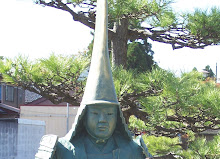While Noda makes important points about the difficulty that Japanese women have returning to the workplace after giving birth - and is courageous to talk about her experiences with infertility and miscarriage (not usually discussed in Japan) - she is wrong to look to western feminism as a model for Japanese women.
Noda writes:
“Family diversity should be the norm everywhere. Every person has the right to create the family he or she would like. I am single but hope to have a child in the future. If I find a partner, wonderful; and if not, I would still want to have a child. According to Japanese law, though, I would have difficulty adopting, and surrogate motherhood is also outside the legal framework.”
Statistics in the United States prove that children who are raised by one parent have a tougher go of it in life. This is a fact. Japanese women, for the most part, understand that if they desire children, they must first find a husband. The idea that you can have a child without a husband is selfishness, not authentic feminism.
As things stand when it comes to procreation, Japanese women are on strike – and for good reason. Reproductive health in Japan is terrible, with very few OB/GYNs, very little day care support and Japanese husbands who believe they have no responsibility to be in their children’s lives (they spend all their time at work, and then attend after-work drinking parties with co-workers). The result has been a frightening drop in Japanese births; right now the Japanese are having children well below the replacement rate.
Japanese women – unlike many western women – are not postponing marriage and children because they want to pursue professional careers, have “freedom” or participate in sexual relationships out of marriage. Many Japanese women postpone marriage and children because their know their husbands will be absent, there is lousy female medical care and they will never be able to return to work.
Noda is right to criticize this, but the answer is not Japanese women taking matters into their own hands with IVF treatments, surrogate mothers and casual sexual relations with men. The answer is to demand that Japanese men embrace their manhood – to challenge them to be men and to put their wives and children before their careers and social status. In addition, the Japanese government must make it easier for Japanese couples to have children; they can do this by giving tax breaks to companies who allow their employees to have more family time at home.
In her piece, Noda made one other point – entirely unrelated to Japanese women – which is worth commenting on. On the Japanese nation she wrote:
“A nation's strength is not measured in its military capabilities but in its environmental power. That's Japan's strength: We are the world leader in environmentally sound energy sources, from hybrid cars to solar power. Our nuclear power plant development is the most advanced in the world, because we have been constantly developing new technologies.”
This is a common Japanese view point, which ignores the fact they have been under the military umbrella of the United States military for 60 years. Instead of having to prepare for a North Korean attack on their own, they have been able to focus exclusively on their domestic economy.
Like a spoiled adolescent who lives at home and doesn’t realize the sacrifices his father makes to pay the rent, many Japanese people have rather naïve ideas about the reality of geo-politics. My guess is that a parking lot of hybrid Toyotas won’t be much help against North Korean ballistic missiles.
Noda’s comment also reflects the Japanese attitude concerning war, which comes from a half-reading of Japanese history. Because Japanese people were the victims of two atomic bombs, they see themselves as eternal martyrs for peace. Yet they conveniently ignore the decades of Japanese war and aggression that lead to the U.S. assault on Japan.








1 comment:
Hi
I have had many debates with Japanese women ovr the same issues you talk about. I agree with you completely that it is well past time Japanese men are made to become an influence in the family instead of a working playboy.
Your comments on Japanese political attitude is also pinpoint accurate. I truly wish they would grow up before they find out that saying "I'm peaceful" doesn't stop a bullet.
Post a Comment